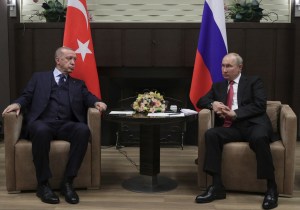
For Turkish President Recep Tayyip Erdogan, Vladimir Putin is a “dear friend” who reportedly warned him that factions within the army were planning a coup in 2016. For the Russian leader, Erdogan is a “tough but reliable partner” who did not impose sanctions on Moscow after the Russian invasion of Ukraine.
Inevitably, questions are being asked about what awaits the Russian president if Erdogan is voted out of power in the May 14 election. The answer, however, is not clear-cut. If Turkish opposition leader Kemal Kilicdaroglu were to win, there might be a shift toward Europe and away from anti-US rhetoric. But he is unlikely to want to lose the geopolitical advantages that come from strong Russian ties and having a foot in both Eastern and Western camps.
Kilicdaroglu has a legitimate chance to end Erdogan’s 20-year rule. With polls so close, it is not surprising that some prominent Western media have labeled the vote in Turkey “the most important election in 2023.” The Kremlin is undoubtedly quite aware that the outcome could have a significant impact on Russian-Turkish relations.
Although Moscow does not openly interfere in Turkish elections, recent developments suggest that Putin indirectly backs his “friend” Erdogan. For instance, on May 3, Russian energy giant Gazprom announced that it has allowed Turkey to defer payments for natural gas until 2024. Such a move could be interpreted as Putin’s gift to Erdogan ahead of the historic election.
Previously, on April 28, the two leaders took part virtually in a ceremony marking the loading of nuclear fuel into the first power unit at Akkuyu nuclear plant in southern Turkey, which is being built by Russian nuclear conglomerate Rosatom. Since the Turkish opposition reportedly opposes the construction of the plant, Erdogan claims that if his opponents come to power, blackouts will become routine.
He is using such rhetoric to justify energy cooperation with the Kremlin, while Putin, isolated from the West, hopes to deepen economic, trade and agricultural cooperation with Turkey. But it is uncertain whether Kilicdaroglu would continue strengthening economic ties with Russia.
Under his leadership, Turkey would likely continue to act as an indispensable intermediary between Russia and NATO countries, which means Kilicdaroglu would seek to preserve Erdogan’s balanced approach regarding Russia. That is why he stressed that “there is no reason for changes in relations between Ankara and Moscow.”
However, Kilicdaroglu’s foreign-policy adviser Unal Chevikoz insists that, in negotiations with Russia, “Turkey will certainly strive for equal relations.
“But we will also remind Russia that Turkey is a member of NATO,” he emphasized.
From the Russian perspective, Erdogan’s lucrative maneuvers between the West and Moscow perfectly suit everyone. But if Kilicdaroglu takes a more pro-Western stance, the Kremlin risks losing a “situational frenemy,” which could have serious consequences for the Russian economy.
Last year, trade turnover between the two countries exceeded US$62 billion, while Putin aims to increase Moscow’s energy cooperation with Ankara and turn Turkey into a regional gas hub. It remains rather uncertain if Kilicdaroglu, who wants to revive Turkey’s EU membership talks, will be interested in Putin’s geopolitical project.
Before prior elections, Erdogan would launch military incursions into northern Syria, since such actions would help him get more votes. But since Kilicdaroglu announced his intention to make a deal with Syrian President Bashar al-Assad to return more than 3 million refugees to Syria, Erdogan seems to have changed his approach regarding the country.
Instead of another military action, Erdogan now seeks to normalize relations with the Russian-backed Syrian leader.
The defense ministers and intelligence chiefs of Turkey, Russia, Syria and Iran met in Moscow on April 25 to hold talks on the future of the Arab nation. Moreover, Turkish, Syrian and Russian foreign ministers may meet in Moscow this Wednesday, just four days before the elections in Turkey. That could be a chance for Erdogan to portray a small, but very important, foreign-policy victory ahead of the vote.
Erdogan already played an important role in helping Russia and Ukraine achieve the Black Sea grain deal, a move that increased his profile as a conflict mediator. Coincidently or not, the deal is set to expire on May 18, just four days after the Turkish elections.
If Kilicdaroglu and Erdogan go to a second round of voting, which looks increasingly likely, and Russia agrees to extend the grain deal, Turkey’s leader could use it to portray himself once again as an indispensable intermediary. But given that the economy, rather than foreign policy, resonates more with voters, such actions are unlikely to help Erdogan defeat his rival.
Since Russia is not able to give any loans to Turkey, or to invest in the country’s inflation-hit economy, Putin’s symbolic acts of support for Erdogan cannot have a serious impact on the outcome of the Turkish elections.
If Erdogan suffers a defeat, the Kremlin will have to adapt to a new geopolitical reality in which the Turkish leadership will take a more pro-European stance and use less anti-Western and anti-American rhetoric than Putin’s “dear friend” did over the past years.
This article was provided by Syndication Bureau, which holds copyright.
Follow this writer on Twitter @nikola_mikovic.

